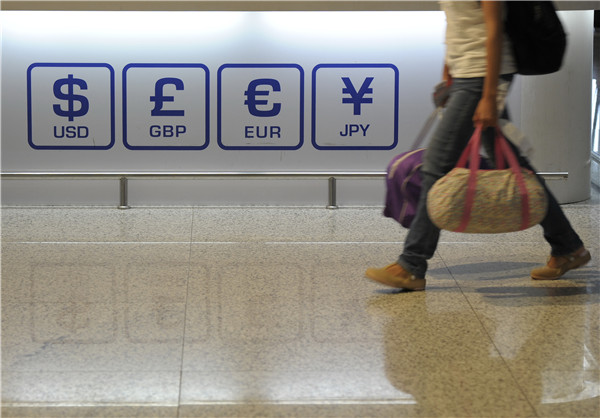Figures suggest the yuan's depreciation hasn't swayed outbound Chinese tourists.
China's recent currency depreciation doesn't bother Beijing resident Wang Wendi, since she recently obtained a 10-year multiple-entry visa to the United States.
She's just excited to explore the U.S.. And she doesn't believe U.S. prices are exorbitant.
"I learned that I only lost about 100 yuan ($16) per 10,000 yuan at the current exchange rate," Wang said on Sept 2, before leaving for the U.S. the next day.
Wang planned to spend 40,000 yuan on a two-week trip with her boyfriend-minus shopping. So, she's out about 400 yuan.
"But many foreign brands are at least 20 percent cheaper in the U.S.," she says.
So, she's saving cash, in the end.
Figures suggest the yuan's depreciation hasn't swayed outbound Chinese tourists.
The number of Chinese people who've booked international trips for the National Day holiday week from Oct 1-7 has increased compared with previous years.
"Looking at bookings, the exchange rate against foreign currencies doesn't seem to have dampened enthusiasm for overseas travel," says Yan Xin, a publicity manager for China's largest travel agency, Ctrip.
The United States, Italy, Turkey, France, Russia, Australia, Greece, Egypt and New Zealand are this year's hottest destinations.
Trips to the Maldives and French Polynesia's Tahiti are nearly fully booked.
There are only a few slots available for most of the group trips to Europe from Sept 26 to Oct 4 on Ctrip's website.
"Many customers booked October trips in July or August," Yan says.
Italy, France and Switzerland remain the most popular European destinations.
"Nobody has canceled their travel plans," says Beijing U-tour International Travel Service publicity manager Li Mengran.
"The exchange rate will not influence group-tour prices this year since travel agencies typically had already locked in annual purchase plans with travel-service providers in foreign destinations, including Europe and the U.S.," Li says.
In addition, most Chinese tourists won't pinch pennies when they shop abroad, she says.
"Overseas shopping is still much cheaper than the mainland."
Still, the rate change is costing individual travelers more, Li says.
"They have to book hotels and pay for the transportation at the going rates."
One consequence may be that more people travel domestically, says Dai Bin, head of the China Tourism Academy, a think tank under the National Tourism Administration.
"If the yuan depreciates (any further), the scale of outbound tourism in China will shrink while inbound tourism will rise," he says.
But Dai doesn't believe the depreciation will affect outbound tourism in the short term. Tourists usually book several months in advance and won't back out just because of a rate change.
It'd take subsequent depreciations to create a substantial long-term impact, he says.
Chinese still strongly desire to travel abroad. That's especially as they become more affluent and destination countries' visa policies are relaxed, while foreign destinations improve services and stage promotions targeting Chinese, Dai says.
Chinese-passport holders now get visa-free access to at least 74 countries, compared to 18 two years ago, Singapore's Lianhe Zaobao newspaper reports.
Nowadays, Australian airports have Chinese-language signs and guides, and duty-free sales staffers who speak Mandarin, according to the Sydney-based Center for Asia-Pacific Aviation.
Package deals are likely to be offered to attract Chinese.
For example, if they travel in Singapore for five days and four nights, they can get a two-day-one-night Malaysia trip for free, Travel Star's marketing manager Zheng Ling-na explains.
But while the yuan depreciation may not keep Chinese from foreign destinations, it may cut into how much they spend after arriving, Dai says.
About 107 million Chinese traveled abroad last year, says the academy's China Outbound Tourism Development Report published last month. The country has been the No 1 source of outbound tourists over the past three years.
"That represents 18 percent year-on-year growth, and we expect it to be 16 percent this year," Dai says.
Roughly 40 percent of outbound Chinese tourists spend more than 15,000 yuan on average during their trips.
Shopping is the primary spending activity.
Chinese tourists spent $164.8 billion in 2014-a four-fold increase compared to 2008, Xinhua News Agency reports. About 88 percent of that was on shopping, the China Tourism Academy says.
Dai suggests tourists keep an eye on rate changes before departure and choose credit-card settlements in yuan or foreign currencies based on current rates.
The yuan depreciation's impact is less likely to be felt in such popular destinations as Japan, South Korea, Australia and eurozone countries, whose own currencies have fallen sharply, according to the Center for Asia-Pacific Aviation.
More than 550,000 Chinese flew to Japan in July-more than twice as many compared with the same period last year.
They spend around $1,100-about twice as much as the next-highest spending nationality, Lianhe Zaobao reports.
Chinese may become especially cost-conscious about luxury items, says Aaron Fischer, regional head of consumer and gaming research at brokerage and investment group CLSA.
Shopping is a central part of Wang's itinerary, which covers Los Angeles, Vegas, Moab and San Jose.
Desert Hills Premium Outlets and Camarillo Premium Outlets are among shopping spots on her journey.
She plans to buy MK and Kate Spade bags, Timberland shoes and Juice clothes.
And, again, she plans to save in the long run.

